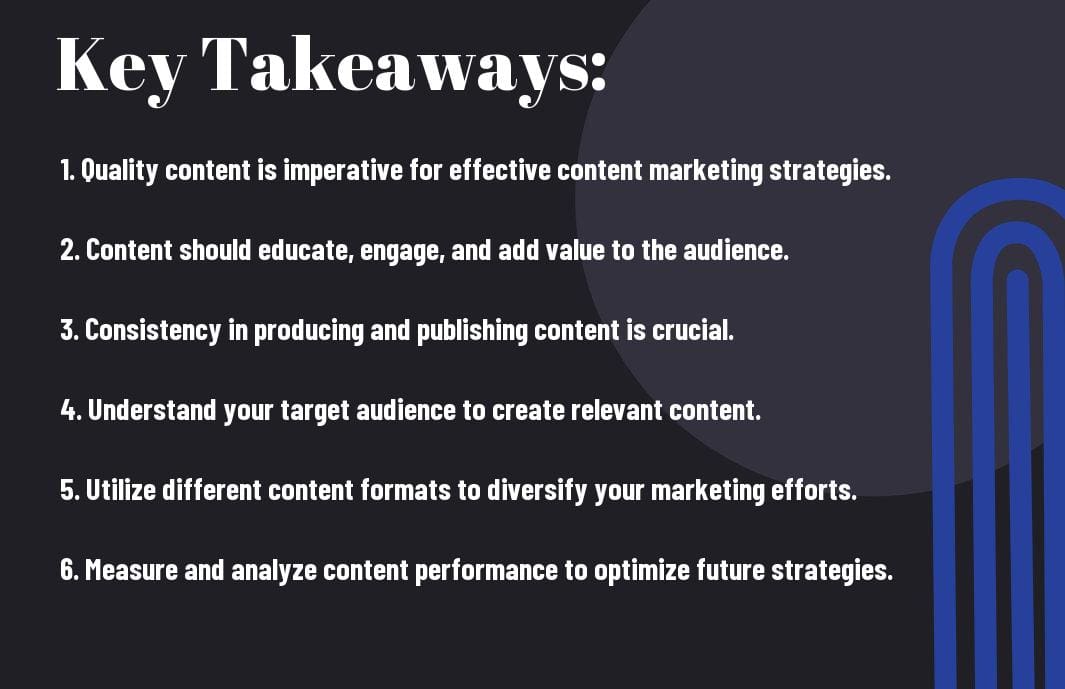Most experienced marketers would agree that content is king when it comes to successful content marketing strategies. In today’s digital age, where consumers are constantly bombarded with information, creating valuable and engaging content has become more critical than ever. High-quality content not only helps to attract and retain the target audience but also plays a significant role in building brand credibility and trust.
Whether it’s through blog posts, social media updates, videos, or podcasts, creating compelling content that resonates with your audience can drive traffic to your website, generate leads, and ultimately increase conversions. Understanding the importance of content marketing and how to leverage it effectively can give businesses a competitive edge in the crowded online marketplace.
Key Takeaways:
- High-Quality Content: Creating valuable and engaging content is crucial for successful content marketing.
- Consistency is Key: Regularly posting relevant content helps build trust and credibility with your audience.
- Know Your Audience: Understanding your target audience’s preferences and needs allows you to tailor your content to drive better results.

Understanding Content Marketing
Definition and Core Principles
Even in today’s digital age, many businesses still struggle with understanding the true essence of content marketing. At its core, content marketing involves creating and distributing valuable, relevant, and consistent content to attract and retain a clearly defined audience. The key principles of content marketing revolve around providing value, building relationships, and driving profitable customer action.
The Role of Content in Marketing Strategies
Understanding the critical role of content in marketing strategies is important for businesses looking to succeed in the digital world. Content serves as the foundation of all marketing efforts, acting as a bridge between brands and consumers. Effective content not only educates and entertains but also inspires action, whether it’s making a purchase, signing up for a newsletter, or sharing on social media.
Content fuels brand awareness, establishes expertise, and fosters trust with the target audience. It is a powerful tool that can differentiate a business from its competitors and drive engagement across various online platforms. Businesses that prioritize high-quality, strategic content are more likely to see a significant return on investment in their marketing efforts.
The Anatomy of Great Content
Once again, let’s investigate into the anatomy of great content that drives successful content marketing strategies. Quality content is the foundation of any successful digital marketing campaign. Understanding the key qualities of successful content and the various types of effective content formats is important for creating engaging and impactful content that resonates with your target audience.
Qualities of Successful Content
Successful content is characterized by several key qualities that set it apart from the rest. First and foremost, relevant and valuable content is important. Your content must address the pain points and interests of your target audience to resonate with them. Additionally, engaging and compelling content captures the attention of readers and keeps them coming back for more. Originality and authenticity are also crucial for building trust and credibility with your audience.
Types of Effective Content Formats
Content marketing encompasses a wide range of content formats that cater to different preferences and consumption habits of your audience. Some of the most effective content formats include blog posts, videos, infographics, case studies, and interactive quizzes. Each format serves a unique purpose and can help you achieve specific marketing objectives. Thou, diversifying your content strategy with a mix of these formats can maximize your reach and engagement.
| Content Type | Description |
| Blog Posts | Informative articles that educate and engage readers. |
| Videos | Visual content that conveys information in an engaging way. |
| Infographics | Visual representations of data and information for easy consumption. |
| Case Studies | In-depth analysis of how your product or service has helped customers. |
| Interactive Quizzes | Engaging content that allows users to interact and learn more about your brand. |
Content Creation And Strategy
Despite the ever-evolving landscape of digital marketing, one thing remains constant: 10 Reasons Why Content is King (And How to Do Content Marketing in 2023). Content creation and strategy play a pivotal role in the success of any content marketing campaign.
Crafting a Content Marketing Strategy
With the increasing competition for online visibility, a well-defined content marketing strategy is necessary for brands to stand out and connect with their target audience. Understanding the brand’s goals, target audience, and unique selling points is crucial in creating a strategy that resonates with consumers. The strategy should outline key objectives, content themes, distribution channels, and performance metrics to track success.
Ideation and Content Planning
Any successful content marketing campaign starts with effective ideation and content planning. This stage involves brainstorming creative ideas, researching trending topics, and aligning content with the brand’s messaging and goals. By identifying audience pain points and interests, brands can create valuable and engaging content that drives traffic and conversions.
Crafting a well-thought-out content calendar ensures consistency in publishing and helps in managing resources efficiently. It also allows for strategic content distribution across various platforms to maximize reach and engagement.
Content Creation Tools and Resources
Creation
Tools and resources play a crucial role in streamlining the content creation process and enhancing the quality of output. Leveraging tools like Canva for graphic design, Grammarly for proofreading, and SEMrush for keyword research can significantly boost productivity and efficiency. Additionally, utilizing freelance platforms like Upwork or Fiverr can help in sourcing quality content creators for specialized projects.
By incorporating the right tools and resources into the content creation process, brands can elevate the overall quality of their content and drive better results.
Optimizing Content for Different Channels
To successfully implement a content marketing strategy, it is important to optimize content for different channels. Each platform has its own unique characteristics, audience demographics, and norms that must be considered when creating content.
Content Customization for Social Media
Customization for social media involves tailoring your content to fit the specific platform you are using. Whether it’s crafting concise and engaging posts for Twitter, visually appealing images for Instagram, or professional updates for LinkedIn, understanding how to adjust your content for each channel is crucial for reaching and engaging your target audience effectively.
SEO and Content: Reaching Your Target Audience
Customization for SEO involves optimizing your content to ensure it appears prominently in search engine results. By incorporating relevant keywords, meta tags, and high-quality backlinks, you can increase your chances of reaching your target audience when they are actively searching for information related to your industry or product.
Another key aspect of SEO and content customization is understanding your audience’s search behavior and preferences. By analyzing search trends and using tools like Google Analytics, you can tailor your content to align with what your audience is looking for, increasing the likelihood of your content being discovered and consumed.
Email Marketing and Content Integration
On integrating content into email marketing campaigns, it is important to align the content with the overall goals and messaging of the campaign. Whether it’s sharing blog posts, promoting special offers, or providing valuable resources, integrating content effectively can enhance engagement and drive conversions.
This strategy is particularly powerful when leveraging segmented email lists, allowing you to deliver personalized content to specific audience segments based on their preferences, behaviors, and interactions with your brand. By tailoring your content to resonate with each segment, you can build stronger connections with your subscribers and improve the effectiveness of your email marketing campaigns.
Measuring Content Marketing Success
Key Performance Indicators (KPIs) for Content
Not all content is created equal, and just producing content is not enough to ensure success in content marketing. It is crucial to measure the effectiveness of your content strategy through Key Performance Indicators (KPIs). KPIs help you track and evaluate the performance of your content marketing efforts against your set goals and objectives.
Analytics and Content Performance Monitoring
Success in content marketing is heavily reliant on analyzing data and monitoring the performance of your content. Utilizing analytics tools can provide valuable insights into how your content is resonating with your target audience, which pieces are driving engagement, and where there might be room for improvement. By monitoring KPIs such as website traffic, click-through rates, conversion rates, and social media engagement, you can make data-driven decisions to optimize your content strategy.
Content performance monitoring is an ongoing process that requires attention to detail and a willingness to adapt based on the insights gained from analytics. By staying informed on how your content is performing and making adjustments as needed, you can ensure that your content marketing efforts are not only reaching your target audience but also driving the desired results.
Content Marketing Challenges and Solutions
Overcoming Common Content Marketing Obstacles
Many businesses face common obstacles when it comes to content marketing. These obstacles can include lack of resources, time constraints, or difficulties in producing high-quality, engaging content consistently. However, these challenges can be overcome with the right strategies and tools in place.
One way to overcome common content marketing obstacles is by developing a content calendar that outlines a clear plan for creating and publishing content. This can help ensure that content creation is organized and consistent. Additionally, businesses can consider outsourcing content creation to freelancers or agencies to alleviate resource constraints.
Leveraging Automation and AI in Content Creation
Many businesses are now leveraging automation and artificial intelligence (AI) in their content creation efforts to streamline processes and improve efficiency. Automation tools can help with content scheduling, distribution, and optimization, while AI technologies can assist in generating data-driven insights for more targeted and personalized content.
Future Trends in Content Marketing
The Impact of Emerging Technologies
Trends in content marketing are constantly evolving, and the impact of emerging technologies is shaping the future of the industry. With advancements in artificial intelligence, virtual reality, and data analytics, content marketers have powerful tools at their disposal to create more personalized and engaging content for their audiences. These technologies enable marketers to deliver targeted messages, interactive experiences, and real-time insights to consumers, ultimately driving better engagement and conversion rates.
Adapting to Changing Consumer Behaviors
For content marketers, understanding and adapting to changing consumer behaviors is crucial for success in the digital age. Consumers today have higher expectations when it comes to the content they consume – they demand relevant, authentic, and valuable information from brands. This shift in consumer behavior requires marketers to focus on creating content that resonates with their target audience and adds genuine value to their lives.
This means that marketers need to stay agile and constantly monitor consumer trends to ensure they are delivering content that meets the evolving needs and preferences of their audience. By building trust and establishing a connection with consumers through valuable content, brands can build long-lasting relationships that drive loyalty and advocacy.
Final Words
Ultimately, successful content marketing hinges on the principle that content is king. By consistently creating high-quality, valuable content that resonates with your target audience, you can build trust, drive engagement, and ultimately achieve your marketing goals. For more insights on why content reigns supreme in the digital marketing realm, check out 8 Reasons Why Content is King in Digital Marketing.
FAQ
Q: What is the importance of content in content marketing?
A: Content is the foundation of content marketing. It is the key element that attracts, engages, and converts your target audience. Quality content enhances brand visibility, credibility, and authority in the digital landscape.
Q: How does content contribute to the success of a marketing strategy?
A: Content plays a crucial role in driving traffic, generating leads, and nurturing customer relationships. By creating valuable and relevant content, businesses can effectively communicate with their audience, build trust, and ultimately drive conversions.
Q: What types of content are effective for content marketing?
A: Various types of content can be used in content marketing, including blog posts, social media updates, videos, infographics, whitepapers, case studies, and more. The key is to understand your audience and choose content formats that resonate with them.
Q: How can businesses ensure the quality of their content?
A: To ensure high-quality content, businesses should focus on providing valuable information, addressing the needs and pain points of their target audience, maintaining consistency in tone and messaging, and conducting thorough proofreading and editing.
Q: What role does SEO play in content marketing?
A: SEO (Search Engine Optimization) is necessary for content marketing as it helps improve the visibility of content in search engine results. By optimizing content with relevant keywords, meta tags, and other SEO strategies, businesses can attract organic traffic and reach a broader audience.
Q: How important is consistency in content creation and distribution?
A: Consistency is vital in content marketing as it helps build brand recognition, establishes trust with the audience, and encourages engagement and loyalty. Regularly publishing high-quality content across various channels can strengthen your online presence and drive results.
Q: What are some metrics to measure the effectiveness of content marketing?
A: Key metrics to gauge the success of content marketing efforts include website traffic, engagement rates, conversion rates, social media metrics, email open rates, and ROI (Return on Investment). By tracking these metrics, businesses can evaluate the performance of their content and make data-driven decisions to optimize future campaigns.




